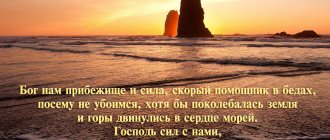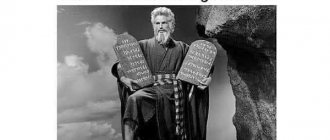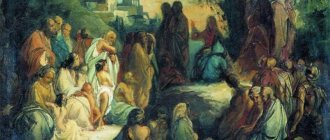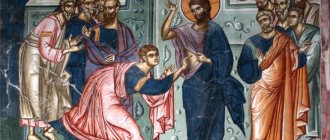One day, a graduate of a theological educational institution approached Archimandrite John (Krestyankin), introducing himself as a “theologian.” “What, fourth?” – the old man was surprised. And to the bewilderment of the young man who immediately became embarrassed, he explained:
“We in the Church know three theologians. The first is Saint John the Theologian, apostle and beloved disciple of the Savior. The second is Gregory the Theologian. And the third is Simeon the New Theologian. It was only for them that the Holy Church, throughout its two-thousand-year history, decided to adopt the name “Theologian.” So you are the fourth?”
So what is it - theology, or theology?
Definition
The word has two meanings:
- the prayer practice of Communion with God, which leads a person to the knowledge of the truths about the Divine;
In this sense, one can understand the words of the Byzantine monk , Evagrius of Pontus: “If you are a theologian, then you will pray truly, and if you pray truly, then you are a theologian.”
- systematic presentation by man of the truths about God, the experience of faith, and communion with God; it is possible because the Creator of the Universe incarnated on earth as the Perfect Man, therefore, God, the Indescribable, the Indescribable, is now accessible to the human mind - as much as it can perceive.
Which “theologians” included the mentioned Fr. John (Krestyankin) great saints of God? Were they spiritual practitioners or scientists? The answer is both simple and incredible: both at the same time. For true knowledge of God is based on experience, faith. Only on its basis does the doctrine arise, which St. John , Gregory, Simeon, bearing the names of the Theologians, should be conveyed to the entire Church. However, hundreds of other holy fathers were such “theologians.” That is why both the practice of prayer and the presentation of the truths of faith have been denoted by one word since ancient times.
Great minds
Theology is a science that has developed thanks to outstanding thinkers. All of them made a significant contribution, but Anselm of Aosta still stands apart from them. By the way, religious feelings in this man awoke at the age of 15.
What is theology in his opinion? It is faith that wants “understanding.” Many scientists agree that this is the best definition. Moreover, it was Anselm who was the author of the argument, which Kant later called his ontological proof. And even later, Thomas Aquinas used it to refute it. In his first works, which were the most significant, Anselm substantiated faith in God without relying on revelation. He only used the human mind. At the same time, he noted that even his “average” mind succeeded. That is, we understand that it is the mind that plays the key role here, but not the intellect.
Bonaventure, who lived at the same time as F. Aquinas, had a great influence on the formation of theology as a science. He became famous for his lectures, which he gave as a theologian in the countries of modern Europe. Bonaventure also wrote a huge number of theological works, thanks to which he gained fame among later researchers of this issue.
Etymology of the term
Theology (θεολογία) is a Greek word formed from two:
- "Theos" ("Theos"), meaning "God";
- "Logos" is a word.
Thus, literally it is “the word about God.”
The term “theology” itself has an ancient, pre-Christian origin.
Interesting fact
It was used by ancient Greek philosophers who did not believe in One God. Therefore, they understood "theology" as the teaching about their pagan gods. It is for this reason that Christians for several centuries did not even use the word “theology,” which, in their opinion, was alien to faith. Only with the beginning of the era of the Ecumenical Councils, when the Church needed to logically and consistently present precisely the truths about God, that is, the doctrine of faith, the term of pagan philosophers entered the life of the Church, but, of course, with a different content than it was among the pagans.
In Christianity
The history of theology has been very long and complex. Augustine said that this is a science that allows you to understand God. He declared that it was categorically different from pagan stupidity and their teachings about the gods. Christian authors have long supported such a direction as triadology. This was the doctrine of the Holy Trinity.
Origen believed that Christ was rightfully the first theologian in the world. In early Christianity, much attention was paid to apologists and apostolic men who wrote various works to explain religion. Most often, these texts were necessary to convert the authorities and the intelligentsia to righteousness.
Is theology synonymous with theology?
"Theology" is a literal translation of the word "theology" into Slavic. Therefore, both words are truly used as synonyms. However, in the practice of the Russian Orthodox Church, the term “theologian” is actually more applied to those who are engaged in spiritual work, prayer, and the word “theology” more often refers to scientific knowledge about faith, for example, graduates of Theological Seminaries and Academies are considered “theologians”.
This happened because before the New Age, theology in the second sense was more widespread in the Catholic West, while the East, although it had a developed tradition of rational understanding of the truths of faith, preferred to base it on prayer. Actually, scientific knowledge about faith appears in Russia from the 17th-18th centuries, and is often designated by the Greek “theology”, although sometimes Russian “theology” is found.
Is theology a science?
Scientific knowledge is a rationalistic, or reason-based, knowledge of the world. In this sense, theology, as prayerful work, of course, does not belong to science; it is a completely different way of knowledge. However, already from the 4th century. The Church also had a need for a coherent, logically verified presentation of the truths of faith, which, of course, is impossible without the help of the human mind - given by God for understanding and understanding.
Gradually, first in the Christian West , and later in the East, the practice of rationalistic reflection on the objects of faith, on the Church, its experience, that is, in essence, a strictly scientific understanding of them, appeared. Until 1917, both in the West and in the East, theology was considered a scientific discipline; many universities had theological faculties, in addition, there were theological educational institutions.
In the West there is no doubt about the scientific nature of theology to this day. In Russia, after the revolutionary events of 1917, open persecution of religion began: it is clear that everything related to it was declared contrary to scientific knowledge (the only true one, in the understanding of atheists), “obscurantism.”
Only on September 17, 2011 did the Federal State Standard for Theology appear. Both seminarians and students of secular higher educational institutions where this specialty works are trained in it. But for another four years the state did not officially recognize the right of theologians to academic degrees. Only on September 25, 2015, the All-Russian Certification Commission officially recognized theology as a scientific specialty. Since that time, it has become possible not only to teach it in higher educational institutions.
Since that time, theology has been officially recognized as a science, but disputes around its “scientificness” among Russian scientists continue to this day. The rejection is that these theologies cannot be “confirmed” by the facts of the material world. However, as is known, experimental confirmation of results is possible only in the natural sciences (biology, physics, chemistry), so in this case we have to admit the unscientific nature of history, literary criticism, philosophy, and in general almost all social and human sciences, which, however, are considered such.
Thus, the current debate around “unscientific” theology is rather a product of the atheistic legacy of the Soviet years.
Modernity
Let us note that during the Soviet era the history of theology practically ceased. Scientists could not even think about it; the subject itself was removed from the educational system. However, in our time there is even a theological specialty that is taught in universities. As an example, let’s take Moscow State University, which has a department of church history. The very concept of theology also began to appear much more often. Thus, the specialty of philologist with knowledge of the basics of theology appeared. Moreover, it is being introduced even into creative specialties. For example, church sewing.
How does it differ from religious studies and philosophy?
Speaking about theology as a scientific specialty, many say that it has occupied the “niche” of other humanities. Is it so?
Religious Studies
The differences are not obvious at first glance, which is not surprising: after all, many of the first religious scholars, researchers of religion (and science arose in the Christian West in the 19th century), were... theologians. For example, one of the founders of religious studies, Friedrich Schleiermacher, was a Protestant pastor. A famous theologian was the founder of the world's first chair of religious studies at Leiden University, Pastor Cornelis Peter Thiele . But still, the subjects of the two sciences are different:
- religious studies studies various beliefs, while theology is strictly confessional, devoted to the study of one religion, be it Christianity or Islam;
- the approach of a religious scholar is non-confessional; modern religious studies abandons attempts to determine the truth or falsity of a particular religion due to the lack of science tools for this; the theologian builds his work based on the truths of faith, as established - not in an “experimental” way, but through the spiritual experience of the confession; It is precisely this part of theology - the basis on religious, that is, non-scientific faith, that now confuses many scientists;
- Religious studies, more than theology, pays attention to the interaction of religion with society, culture, the state, and other social institutions.
Philosophy
The closeness of theology to philosophy is equally understandable: after all, at least from the 4th century. the holy fathers of the Church used philosophical approaches developed in antiquity to explain such concepts as Essence, Hypostasis of the Divine, Trinity of God, and others. But - they used it, giving primacy to prayer, asceticism, and not to rationalistic reflections.
The bishop in a shepherd's cap from Trimifunt, unskilled in disputes, but ardent in faith, did the unexpected at the First Ecumenical Council. He took a brick in his hands and, saying a prayer, squeezed it. The fire flared up, water flowed, and wet clay was left in his hands. “Look, philosopher,” said Saint Spyridon to the noisy and loquacious heretic philosopher Arius, “there is one plinth (brick), but there are three in it: clay, fire and water.”
And if philosophy claims to explain the general laws of world development, then for theology it is only a tool that allows one to present the ineffable Truths of faith in a language understandable to people.
What does theology include (sections)
Traditionally, the branches of Christian theology are considered to be:
- study of the Holy Scriptures , otherwise - biblical studies, including textual criticism, the history of the Old and New Testaments, as well as their interpretation - hermeneutics;
- dogmatic theology (the science of dogma);
- basic theology, otherwise called “fundamental”; this discipline develops clear, precise principles for the presentation of faith; it is so closely related to apologetics (the refutation of false teachings) that some use the terms “mainstream theology” and “apologetics” interchangeably, while other authors still consider them to be different directions;
- patrolology - the study of the works of the Holy Fathers of the Church;
- moral theology, or the doctrine of morality, ethical standards of Christianity;
- Church history;
- liturgics - the history of its worship, as well as its interpretation, liturgical theology;
- canon law - the study of the legal norms of the Church;
- asceticism - a section of theology devoted to the spiritual practices of asceticism;
- pastoral theology; This section of theology is devoted to the priesthood, the spiritual qualities of the shepherd, and his ministry.
The branches of theology are interconnected, as well as with secular sciences. For example, liturgics as the history of liturgy is inseparable, on the one hand, from church history, and on the other, it works on the basic principles of approaching the liturgical text as a historical source. And they were developed by the secular historical discipline - source study.
Bomberg Rabbinical Bible. Venice, 1524-1525. Book of the Prophet Daniel (beginning)
Patrolologists and researchers of the works of the holy fathers largely rely on materials from the history of the Church, as well as the secular history of philosophy. The achievements of linguistics in the field of translation and interpretation of texts in ancient languages come to their aid. So, theology always actively interacts with the secular humanities - but it also helps historians, philosophers, cultural scientists, and linguists with its findings.
Russian Orthodox Church
Report by the Chairman of the Department for External Church Relations of the Moscow Patriarchate, Metropolitan Hilarion of Volokolamsk, at the plenary session of the First All-Russian Conference “Theology in the Humanitarian Educational Space”, which opened in Moscow on June 14, 2022.
Dear guests of honor and conference participants! Dear Colleagues!
Let me, first of all, thank the leadership of the National Research Nuclear University MEPhI and personally Rector Mikhail Nikolaevich Strikhanov for the opportunity for all of us to gather in this room to discuss the pressing problems of the formation of the Theology branch in modern Russia.
When five years ago we jointly opened the department of theology at this leading Russian university, many were perplexed: what does theology have to do with nuclear physics? Why should nuclear scientists study theology? The answer to these perplexities lies in the name of the educational institution, or more precisely, in one word from this name: “university”. What is a university? This is by no means a specialized institution with a narrow profile, not a vocational school. This is an educational institution that trains individuals who, being professionals in their field, are at the same time widely erudite in other fields, including the humanities.
Theology has exactly the same relationship to nuclear physics as philosophy, history, law, Russian language and literature, and other humanitarian disciplines. For many decades, theology was artificially thrown out of the educational space. The Bible, Koran and Talmud were actually forbidden literature, and people learned about Jesus Christ mainly from The Master and Margarita.
This unnatural situation has now been corrected, and theology has taken its rightful place in the system of humanities taught in a secular university. The question of whether theology is a science or not is virtually closed: the inclusion of the specialty “Theology” in the nomenclature of the Higher Attestation Commission put an end to the debate on this topic.
This was followed by the approval in September 2015 of a passport for the scientific specialty “Theology”. The Expert Council of the Higher Attestation Commission on Theology began its work, the composition of which was formed with the support of religious organizations included in the Interreligious Council of Russia. Each of the experts included in the Expert Council has a name in a certain field of humanitarian knowledge, at the same time, these are scientists who are trusted in the corresponding religious organization.
Thus, from the very beginning, the project of introducing the specialty “Theology” into the secular educational space was of an interreligious nature. And it is no coincidence that today in this hall there are representatives of traditional confessions of Russia.
Under the auspices of the Higher Attestation Commission, the first Joint Dissertation Council in the specialty “Theology” was created in the history of Russia. On June 1 of this year, the first defense of a dissertation for the academic degree of candidate of theology took place in modern Russian history. This defense became a kind of test of strength for the members of the dissertation council, since atheistically minded representatives of the biologist community sent five negative reviews, accusing the dissertation author of being based on the “hypothesis of the existence of God,” and such a hypothesis supposedly contradicts the scientific worldview. However, 21 members out of 22 present voted in favor of awarding the required degree to the dissertation candidate.
This defense demonstrated, on the one hand, a high degree of unity of those involved in the formation of the scientific field of “Theology”. On the other hand, it showed that our society still retains the inertia that comes from the times of forcibly imposed atheism, when people were taught that religion is incompatible with science. And therefore, there remains a need to explain again and again what theology is and why it is needed.
Theology is a systematic form of expression of the doctrine of a certain religious tradition, its creed, it forms a religious worldview. The creation of a high-quality and modern system of theological education in a country like Russia, where people of different faiths have lived in peace and harmony for many centuries, is one of the factors in the sustainable development of the state and interreligious peace in it.
To study religious phenomena from a theological point of view means to study them in the larger context of a religious tradition, just as the study of philosophical texts and ideas requires viewing them in the context of a philosophical tradition. And this requires systematic theological education, an important element of which is internal communication in the community of theologians, including both teachers and students. In this respect, theology has all the features characteristic of other scientific disciplines.
The combination of personal experience and theological competencies with scientific research methodology within theology gives an effect that is impossible with an external, detached approach to religion. If, for example, a religious scholar studies religious practices using the method of outside observation, then he must make a special effort to model religious consciousness, whereas the theologian is already included in religious practices and is the bearer of religious consciousness.
However, this applies not only to religious studies, which is aimed at the study of religion. It is equally important that theological competencies and theological views on the phenomena and processes being studied are useful, and sometimes necessary, for specialists in other sciences whose field of view is man, nature or society.
A theological perspective, along with a philosophical or cultural perspective, can open up new perspectives, approaches, and a fresh look at old problems to representatives of other disciplines.
In this context, we can talk about the importance of such areas of theological research as the theology of personality, theology of culture, theology of education, and pastoral psychology. They are a kind of bridge between the theoretical problems of theology and the practical realities of society.
However, the most striking mediator here is ethics, which makes it possible to perceive and analyze existing socio-political, cultural, economic and other social processes through the prism of axiological and normative attitudes, which are fundamentally - whether someone wants to admit it or not - have a religious basis. It is religious ethics that makes it possible to use a language that is understandable to modern people and does not require special theological training.
And all these possibilities are applied where theology is included in the practice of universities and scientific communities, where it is a legitimate and equal participant in scientific and academic communication.
We are moving along this path. This is evidenced by the presence here of a large number of directors, professors and teachers of numerous secular and church universities, in which theological programs are implemented. And since we are located at the National Research Nuclear University MEPhI, I would like to note that the five-year work of the theology department of this university shows successful experience in using the capabilities of theology as a humanities science.
Those who today try to challenge the scientific nature of theology proceed from certain stereotypes that developed during the Soviet era and have not been eradicated to this day, in particular, from the idea that scientific and religious approaches are mutually exclusive.
However, it is necessary to point out the conventional nature of scientificity. The idea of what belongs to science and what remains outside it is the result of a certain convention, that is, an informal mutual agreement between scientists. Thus, before the scientific revolution of the 17th century, science was identical to scholarship as such: a philosopher, an erudite, a sage was considered a representative of science.
After the emergence of scientific natural science, criteria were established that separate science from non-science: rationality, empiricism and objectivity. These criteria remain important today, but scientific character is not determined only by them. In the process of the development of science, scientific paradigms changed, and what was previously not considered scientific acquired scientific status. In addition to the natural and exact sciences, new humanities and social sciences appeared, which did not immediately find their place in the academic space.
Some of them acquired scientific status relatively recently, for example, psychology, sociology, and cultural studies. In addition, new scientific disciplines have emerged as a result of interdisciplinary interaction: within the natural sciences (for example, biochemistry) and at the intersection of the humanities and natural sciences (cognitive science). In other words, science has grown with new disciplines, and this process will most likely continue.
It should also be noted that the recognition of new scientific disciplines was associated with their institutionalization: over time, new specialized departments and then faculties were opened at universities. It is enough to remember how difficult it was for sociology to enter the university space, and yet today no one questions its scientific status.
This also points to another important circumstance. Scientific research areas are those that are included in the organizational structure of educational and research institutions. However, such inclusion is not only recognition of the scientific nature of a particular discipline, but also a guarantee that the research and educational activities carried out within this discipline will meet scientific criteria.
Thus, the inclusion of theology in a complex of scientific disciplines is a multifactorial process. It is necessary to understand that certain theological disciplines are scientific in terms of research methodology and the procedure for qualifying it as scientific.
Recognition of the scientific status of theology is consistent with modern world experience and the strategy for integrating domestic science into the world scientific community. But it is important that theology becomes open to public and social problems being solved in our country, and that its role in the general scientific and humanitarian space is fully used for the development of interreligious dialogue and cooperation.
To date, through the joint efforts of representatives of traditional faiths and the academic community, with the active participation of government authorities, the framework of a system for training personnel in the specialty “Theology” has been erected. The most important stage in the development of the industry has been completed. But there is a new stage ahead, and I would like to share with the conference participants some thoughts on the issues that face our scientific and theological community at this new stage.
An important issue is the lack of understanding in the academic community of the criteria that determine the scientific status of theology, which prompts some representatives of this community to criticize, far from a constructive position.
I will base my analysis and examples on the Orthodox tradition that I represent. Turning to it allows us, for convenience, to use the terms theology and theology interchangeably.
Let me remind you that in the Orthodox tradition, theology is the value-worldview core of faith. It is the basis of normativity, not related to science. However, it is studied by special theological disciplines that present, interpret and substantiate the teachings of the Church.
So, for example, dogmatic theology is a detailed presentation of the basic doctrinal truths that are binding on all members of the Church. Closely related to doctrine are such disciplines as apologetics, moral and pastoral theology, within the framework of which doctrine is applied to various areas of church life - mission, religious and moral preaching, counseling.
Another example: patrolology, which studies ancient church writing. Her subject area is theological texts and the works of ancient church writers. In this sense, it is similar to such disciplines and scientific specialties as the history of philosophy or the history of literature.
I would like to note that in recent decades a lot of independent patrolological research by secular and church scientists has appeared in Russia, many of which are in no way inferior to the works of their foreign colleagues. New translations of patristic works were made, equipped with scientific commentaries and reference materials, translated into Russian and fundamental works of foreign authors introduced into scientific circulation.
Another example is liturgics, the subject of which is worship, and adjacent disciplines, for example, the history of church singing.
I’ll complete the list of examples with biblical studies, which also has its own special subject, problem field, and research methods. An interdisciplinary approach is widely used in modern biblical studies. The study of the Holy Scriptures is impossible without a deep study of ancient languages (Hebrew, Greek, Aramaic, Syriac, Coptic, Latin, etc.) and comparative linguistics; it requires deep awareness of the history and culture of the ancient world. Studying the Bible is not just the study of an ancient text, it is also the study of the rich history of its interpretation.
Theological refers to such special disciplines studied and taught in theological schools as Church history, canon law, Christian archeology, and the history of Christian art. These disciplines are theological because they are directly related to the life of the Church, but from the point of view of internal organization and methodology they are similar to other humanities and social sciences. They can well be called theological, attributed to the scientific specialty “Theology” and included in a new branch of knowledge.
In passing, I would like to note that it is possible to talk about theology as a “new” branch of knowledge only in the current Russian context. Historically, it was theology that stood at the origins of university education, and all the largest universities in Western Europe began as theological schools.
I would like to especially dwell on the most important trend of recent years in the Russian educational space: the gradual rapprochement of the sphere of confessional spiritual education with the sphere of secular education. In Soviet times, these spheres were separated, and a blank, impassable wall was built between them. Today this wall has been destroyed, as evidenced, in particular, by the state accreditation of several leading theological schools of the Russian Orthodox Church.
In preparing our educational institutions for accreditation (and this process is still far from complete), we are taking care to bring them to the scientific level at which secular higher education is located in modern Russia. This applies not only to technical parameters (number of square meters per student, availability of a gym, etc.), but also to the requirements for scientific programs and the teaching methodology itself. Only those religious schools that fully comply with the formal criteria set by the state for higher education institutions receive accreditation.
One of the actions aimed at increasing the level of education in our religious schools was the introduction of a unified educational standard. Before this, the curriculum of one seminary or academy could be strikingly different from the programs of another theological school of a similar level. Now all theological schools practice according to a single standard.
Another large-scale project that is being carried out in the Russian Orthodox Church under the direct supervision of His Holiness the Patriarch and the Supreme Church Council is the creation of new textbooks for theological schools. Until recently, our students studied either from pre-revolutionary textbooks or from literature published in exile. The time has come to update the entire body of educational literature so that each discipline is taught at a modern scientific level.
Today I am pleased to present to the high assembly advance copies of three textbooks, which were discussed and approved yesterday at a meeting of the Supreme Church Council.
The first of them is called “The History of Non-Christian Religions.” This is a detailed and non-judgmental description of the religious teachings and traditions of monotheistic religions - Islam and Judaism, as well as other religions, including Hinduism, Buddhism, Confucianism. The textbook has already been tested in teaching at Sretensky Theological Seminary and has been highly praised by specialists, including secular ones.
Another study guide is called “The Four Gospels.” This is the first volume of a planned three-volume series. The book is intended to teach the student to independently work with the text of the Gospel, compare the parallel narratives of the Evangelists, and identify points of difference and similarity between them. The textbook introduces the student to ancient and modern interpretations of the Gospel texts.
Finally, the third textbook is an anthology of ancient Christian writing under the general title “Holy Fathers and Teachers of the Church.” This is an anthology that is an appendix to a textbook on patrolology, which is still in the process of being written.
Why am I presenting these textbooks here, within the walls of the MEPhI University, where representatives of secular educational institutions have gathered? Because these textbooks are created not only for theological schools. I hope that they will be no less in demand in the departments of theology of secular universities. After all, the availability of modern teaching aids is the most important factor in the success of our common endeavor. And I perceive the formation of the “Theology” branch as a common project of confessional educational institutions, be they Orthodox, Islamic and Jewish, and secular universities in which this scientific branch is developing.
In conclusion of my report, I would like to draw attention to what we need to do in the near future.
On the last day of May, the Presidium of the Higher Attestation Commission adopted a recommendation to award academic degrees not in “related” fields, as was previously assumed (philosophy, history, etc.), but in theology. This means that now in his research the theologian is no longer obliged to “tailor” theological topics to these related sciences and work with an eye to the specifics of specific scientific methodologies or academic habits common in the relevant communities of specialists. We can safely rely on theological methodology itself and the development of theological problems (including issues of dogmatic, liturgical pastoral theology, biblical studies, etc.).
This poses new challenges for us to fill the field of knowledge “Theology” with real content. As I already said, theology is not an analogue of religious studies. It cannot be impersonal from a religious and confessional point of view. The passport of the only scientific specialty 26.00.01, so similar to the passport of the religious studies discipline, does not reflect either the content or objectives of theology.
At the current stage, it is necessary to identify specific areas within the branch of knowledge “Theology” - Orthodox, Islamic, Jewish. I believe that the design of theology as a branch of knowledge should take into account the prospect of the gradual formation of full-fledged groups of specialties related to a particular religious tradition or denomination.
I am convinced that the industry should be built on religious and confessional principles. The division of theology into three groups of specialties will be similar to how, for example, philological sciences are divided into literary studies and linguistics, and physical and mathematical sciences include astronomy, mechanics, and so on. The only principle of division in this case will be belonging to a certain religious and confessional tradition.
In each of these groups at this stage it is possible to provide for one specialty of the same name. In the future, as each of the specialties is actually filled with scientific achievements and specialized specialists appear, differentiated specialties can be gradually introduced within the confessional groups of specialties, disaggregating the existing ones.
In order to develop the scientific branch of “Theology”, we must not mix religious traditions, but study each of them separately. At the same time, it is important to find in them, despite all the doctrinal and cultural differences, a common core of values and worldviews, and to study it from a theological standpoint. This is the guarantee of interaction between different religions, ethnic groups and cultures, and in the long term, the guarantee of preserving the unity of our great multinational country, which we are obliged to preserve not only for ourselves, but also for future generations.
DECR Communications Service/ Patriarchia.ru
History and justification of the principles of Christian theology
The “Doctrine of the Gods” was known long before the birth of Christ : it was among the Greek and then Roman philosophers. Christianity, arguing with them, nevertheless, since the time of the Apostles, recognized that the True God was known to the pagans, however, they “suppressed the truth through unrighteousness.”
St. Paul writes that “the wrath of God is revealed from heaven against all ungodliness and unrighteousness of men, who suppress the truth in unrighteousness. For what can be known about God is manifest to them, because God has made it known to them. For His invisible things, His eternal power and Godhead, have been visible from the creation of the world by looking at what is made, so that they cannot be answered” (Rom. 1:18-20).
Varieties
“Consideration of creations” for the sake of knowledge of the Divine is one of the most ancient varieties of “teaching about the gods,” echoes of which can later be found in the works of the holy fathers.
Natural theology
It has also been called "natural", "worldly", or "rational". The main idea of theological reflections of theologians working in this direction is the possibility of man knowing God through reason, through knowledge of the world around him.
Theology of the Early Greek Philosophers
These are thinkers who lived in the 7th-5th centuries. BC, they are also called “Pre-Socratics”, as the predecessors of the great Socrates, the teacher of another outstanding philosopher Plato. Pagan philosophers set out to explain the origin of the world from “nature.” But in their writings the word “theos”, or “deity”, which created the visible world, also often appears.
The Creator is known from divine actions in the world. A common feature of Greek philosophers is a sharp rejection of the rites and rituals of paganism as “mad and wicked,” while the real God, the Creator of the world, could be identified:
- with the sky ( Xenophanes );
- with logos or word, the thought of man ( Heraclitus );
- in general with nature as a whole ( Parmenides ).
Chapter of Plato, Roman copy. The original was exhibited at the Academy after the death of the philosopher (348/347 BC). According to Diogenes Laertius, Plato's name at birth was Aristocles. Date of birth: May 7, 427 BC. e. Place of Birth: Ancient Athens He was also philosophically influenced, along with Socrates, by the Pre-Socratics Pythagoras, Heraclitus and Parmenides. According to ancient legends, Plato died on his birthday at the age of 81 in 347 BC. e. He was buried under the name Aristocles.
Platonovskaya
This philosopher, whose works have not lost relevance even for scientists of our time, drew attention to the images inappropriate for a deity that Greek myths contain. Here the gods are shown as subject to human passions and grave sins. According to Plato, it is necessary to establish “models of theology” that prescribe that God must be presented as good, bestowing peace, full of virtue - otherwise he is not a deity at all.
The thoughts of philosophers were well known to educated Christians. Even to the Apostles, the value of trying to see the Divinity “through viewing creation” was obvious. And later, images of Plato, Aristotle, Socrates, and other Greek philosophers will appear on the frescoes of some Orthodox churches, although, of course, without the halos appropriate to saints. For example, images of the philosophers Aphroditian and Hermias Trismegistus are on the doors of the Assumption Cathedral of the Moscow Kremlin, and in the Novospassky Monastery of the capital you can see images of Plato, Socrates, Aristotle.
Images of pagan thinkers and writers - frescoes from the dining room of the Bachkovo stauropegial monastery of the Bulgarian Orthodox Church. On Plato’s scroll it is written: “God has always existed, exists and will exist, as he has no beginning and will have no end.” From Socrates: “And he will receive flesh from a Jewish virgin and will be crucified. And blessed are those who listen to him. . "
Theology of the Eastern Fathers
Svtt. Basil the Great, Gregory the Theologian, Cyril of Jerusalem , and dozens of others are the creators of the Creed, a generally logical, consistent, accurate presentation of Christian dogmas, the true treasury of the Church. They combined the prayer experience of both their own and other ascetics with logical, rhetorical techniques developed by philosophers of ancient times. At the same time, reason occupied a subordinate position in relation to faith. It was only a means of logically consistent presentation of spiritual experience, and not a means of actual knowledge of God.
Basic principles of theology
The most important of them for Eastern theology:
- speaking about God and faith, the theologian proceeds not from his own “common sense”, but from the Subject of theology, God; he does not “construct” reality, but tries to present the Truth; hence the paradox, sometimes even illogicality of theological formulations - after all, Jesus Christ said: “My kingdom is not of this world” (John 18:36);
Interesting fact
Until the 20th century. this basic principle of theology was completely contrary to scientific approaches. Scientists since the 18th century considered the world to be knowable by the human mind - until, in the process of the development of science, its infinite complexity became clear. For example, humanists have realized the harmfulness of studying, for example, history, from the point of view of the “common sense of the researcher,” when the scientist creates a picture of the past rather than trying to understand it.
Phenomenology began to take shape - a special approach to the culture of the past or present, when it is considered as a “phenomenon”, a self-sufficient phenomenon with its own logic and meaning that must be understood. Thus, it took scientists several centuries to reach the scientific principle discovered by theologians at the dawn of church history.
- another principle is churchliness, or reliance on the experience of the Church; it is summarized by Church Tradition , which includes both Scripture and, in general, all the spiritual wealth of the Church, from the experience of asceticism to church art, worship;
- finally, the theologian proceeds from the principle of soteriology (from “σωτηρία”, “salvation”); it means that God’s actions in the world are aimed at delivering fallen man from sin, death, that is, at his salvation; this is an immutable truth; guided by it, the holy fathers consistently defended the idea of Christ as the Perfect God and Man, the brother of people in the flesh, who saved the human race; any other understanding of the Son of God (as a blessed man, or the creation of God the Father, as the heretics thought) did not correspond to the economy of the salvation of people, was rejected.
Medieval theology
The situation is different for Western Christians. Here “natural theology” received a much more serious development than in the East. After all, the Western Church, which baptized the “barbarian” peoples who captured from the 5th century. territory of the Western Roman Empire, was looking for opportunities to simply and clearly explain Christian values and the truths of faith to neophytes. And the easiest way to do this was “from the human mind.” This is how the so-called “scholasticism” or “school theology” arose, which was actually taught in theological educational institutions that trained clergy.
Over time, scholasticism received a more serious basis, thinking about the possibility of knowledge of God in general with the help of reason. The so-called “dispute about universals,” or concepts that define God, began. At the same time, some scholastics, “realists,” recognized that such concepts, albeit immaterial, exist, therefore, it is possible to know the Creator with the help of reason. Other authors (“nominalists”) argued that every word about God does not give His knowledge, it is the fruit of purely human reasoning. Discussions among Western theologians developed for several centuries in line with these two points of view.
Proofs of the existence of God
They were formulated in the 12th century. Anselm, Bishop of Canterbury , who can be classified as a "realist". This:
- the perfection of the surrounding world, its goodness - having, therefore, the source of the Supreme Good, God;
- the presence of a cause for every thing in the world - therefore, he himself also has a First Cause, or Creator;
- ideas about God that each person has.
Anselm's main thesis:
“I believe so that I can understand.”
Thus, faith is the first step to knowing God, and then understanding and knowledge with the help of God-given reason is necessary.
"Summa Theologica" by Thomas Aquinas
Thomas Aquinas , who outlined his views in the famous Summa Theologiae, looked at the knowledge of God in a different way Thomas divided it into “philosophical” and “theology” itself, by which he meant Revelation. However, the first step is knowing the Lord through His creations and the surrounding world. Such rational theology soon, however, turned out to be untenable: by the 14th century. There is a gradual decline of the scholastic movement, caused by the dissatisfaction of theologians with the rationalism of the teachings of Thomas.
Thomas Aquinas (1225-1274) The portrait was painted by the Italian artist Carlo Crivelli. Revival. XV century. In the 13th century, Thomas Aquinas tried to reconcile the philosophy of Aristotle with the theology of Augustine. Thomas Aquinas used both reason and faith in the study of metaphysics, moral philosophy, and religion. Based on belief in a Creator, he offered five proofs for the existence of God. Canonized by the Catholic Church on July 18, 1323.
A kind of “full stop” in the development of scholasticism is put by the monk of the Franciscan order, William of Occam . His logical principle is “Do not multiply entities unnecessarily.” According to Occam, reason is suitable for studying the world, while faith is suitable for understanding the truths of theology.
However, by the 14th century. Western theology has already been rationalized quite deeply, so it is the reliance on reason that becomes its main feature. An example is some of its modern movements among Catholics and Protestants.
What does the term "political theology" mean?
This is a combination of many theological teachings that try to identify the foundations of social and political institutions from the Bible and Holy Tradition. It is believed that it originated in Byzantium, when theologians substantiated the idea of a “symphony” of state and secular authorities. However, it was in the West, starting at least from the 19th century. this direction has acquired independent significance. Theologians of the direction:
- they try to reconcile the order, principles of construction, operation of political institutions, power with Scripture, Tradition;
- determine how it is possible to influence the morality and ethics of society, based on the principles of Christianity
Liberation Theology
This trend originated in Latin America in the 2nd half. 1950s It is as close as possible to political theology. Its essence:
- using God-given talents for the benefit of people;
- overcoming poverty as a source of sin that provokes a person to unseemly acts.
From supporters of the teaching that arose in poor countries, one can hear, for example, the following more than peculiar interpretation of the Gospel:
“He (Jesus) was with me in difficult times, in the most terrible moments of my life. Jesus Christ was undoubtedly a historical figure - he was a rebel, one of our anti-imperialists. He rebelled against the Roman Empire. For who could say that Jesus was a capitalist? No. Judas was a capitalist, taking his pieces of silver! Christ was a revolutionary. He rebelled against religious hierarchies. He rebelled against the economic power of the time. He chose death to defend his humanistic ideals, and he longed for change. He was our Jesus Christ." The author of the quote is Venezuelan President Hugo Chavez, an active supporter of liberation theology.
Such views are also very common not only among Catholics, but also Protestants.
Hugo Rafael Chavez Frias (1954-2013). 47th President of Venezuela (April 14, 2002 - March 5, 2013)
Story
Theology is the science of God, which originated in Ancient Greece. Then it was about the gods. Initially, the Greeks called ordinary poets theologians or theologians. Later, people who wrote or transmitted scriptures about the gods began to be called this. Then this name was assigned to interpreters of ancient myths.
Aristotle considered this science merely as an integral part of philosophy. He did not single it out, considering it something on par with physics and mathematics. Later, other thinkers, thanks to the conclusions of Aristotle, were able to justify the importance of astrology from a theological point of view. In the Middle Ages, this all became even more active, since Christians were of great interest in astrology, which was forbidden to them.
Theology in philosophy is the study of works of a divine nature about the world order. That is, the emphasis is placed precisely on how the world works. Marcus Varro believed that there was a civil, mythical and physical theology. The first is intended for the people, the second for poets, the third for philosophers and thinkers.
What questions does theology solve?
This:
- scientific; problems of studying the history, tradition of the Church, the treasury of its spiritual experience;
- social, related to spiritual and moral education based on a thousand-year tradition; According to modern research, many students come to theological majors with the attitude: “I want to know more about my culture.”
Euthanasia in the light of theology
The deliberate taking of life with the consent (or even at the request) of a seriously ill person causes an ambiguous attitude among Christians. The position of the Russian Church is formulated in the “Fundamentals” of its social concept:
- in some cases, when a cure is clearly impossible and only senselessly prolongs a person’s suffering, a transition to palliative care is needed, and pastoral care is also necessary to prepare the Christian for death; the duty of neighbors is to alleviate suffering and provide care;
- however, intentionally ending a life is murder or suicide if the decision is made by the individual.
Catholics also have a negative attitude towards euthanasia. Less definite is the position of Protestants, who, on the one hand, do not question the providence of God in a person’s life , on the other hand, they believe that in some “exceptional” cases the decision can be made by the person himself. Such a veiled justification for euthanasia has already led to its adoption by some Protestant countries (for example, Holland, the USA).
Terminology issue
The terminology of this science in Russian is somewhat complex. O is not considered an accurate translation of the word "theology" from ancient Greek. In Russian Orthodoxy, it is customary to use exclusively the word “theology”, but not “theology”. The fact is that not a single priest will say this, since such an explanation will be perceived as Latinism. At the same time, Russian theologians very carefully, attentively and tirelessly followed the development of theology, often taking something from it with great talent and caution. I. Kireevsky, who is considered the founder of religious philosophy in Russia, believes that theology is scientific theology. At the same time, he emphasizes this in a negative way.
Orthodoxy, Catholicism, Protestantism - distinctive features of theology
Now Orthodox theology works in line with the Eastern patristic tradition, especially since many approaches more than a thousand years ago are quite relevant to this day.
Western theology, both Catholic and Protestant, is increasingly moving along the path of rationalization. Thus, within Catholicism there arise:
- “updated” versions of scholasticism (neo-Thomism);
- modernism (advocating the idea of “dogmatic development” of the Catholic Church, its adaptation to the surrounding world, modern culture).
Various Protestant denominations are especially active along the path of rationalization. Among the most famous trends is the so-called liberal theology, which advocates the importance of a person’s individual experience and protests against any religious dogma.
At the same time, in recent years there has been a tendency in Catholic theology towards rapprochement with Orthodox theologians and an appeal to the Eastern tradition:
- a “new theology” appeared, advocating an appeal to the tradition of the Eastern Fathers;
- a special direction of Catholic theology is represented by scientists and liturgists who actively study the history of the liturgy of the East during the Byzantine Empire; the works of some of them, for example, Greek Catholic priests Juan Mateos and Robert Taft, were translated into Russian more than once, and their value was recognized by Orthodox theologians.
of H. Mateos “The Ministry of the Word”, written on the basis of Greek liturgical texts of the 6th-9th centuries, is widely known among Orthodox theologians It is dedicated to the history of the first part of the Byzantine liturgy (“the liturgy of the catechumens”). Interesting details of the Great Entrance, as it took place in ancient Byzantium, are reported by the teachings of H. Mateos, R. Taft in the book “The Great Entrance”.
Another interesting work, translated into Russian by Metropolitan. Hilarion (Alfeev) the work of Pope Benedict XVI “Theology of the Liturgy”.
Development problems
They are somewhat different in the West and East.
In the Catholic and Protestant world, first of all, the pressure of the processes of secularization and de-Christianization is growing, which complicates the work of the theologian and leads to the weakening of the foundations of faith.
For Orthodox theologians, to these problems are added others that have arisen during the years of propagation of atheism, for example, in Russia. This:
- a general sharp decline in the level of theological education due to the total closure of theological schools after 1917;
- the more than 70-year-old isolation of theology “on itself,” which to this day makes communication with secular science difficult; In many respects, this is where the ambiguous attitude of part of the scientific community towards theology as a direction of research comes from.
Personnel problem in the Russian Orthodox Church. As of 2022, the number of priests is approximately 40,000. This is approximately 10,000 less than it was in 1915, that is, the pre-revolutionary level of the number of shepherds has almost been reached. The massive opening of churches in the 1990s often led to the fact that, in an effort to ensure liturgical life, bishops ordained people without theological education (by the end of the 20th century, only a third of pastors had it); It often later turned out that newly ordained priests were generally unsuitable for ministry.
Profession of theologian: where they study, what they work for
There are currently 39 accredited higher educational institutions in Russia where you can obtain a specialty. Among them:
- theological seminaries, academies (Moscow, St. Petersburg, Sretenskaya), others; as well as the Orthodox St. Tikhon's Humanitarian University;
- secular universities with faculties or departments of theology.
Graduates are engaged in:
- scientific activities;
- teaching in religious and secular educational institutions;
- journalism;
- work in the field of culture (museums, libraries);
- and, of course, those who wish perform church service, receiving holy orders.











